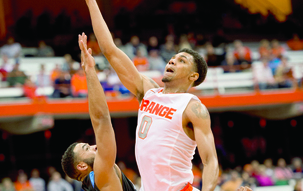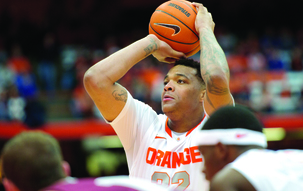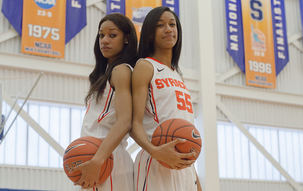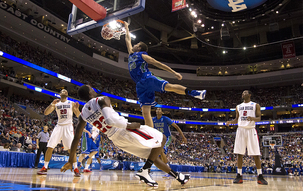All Eric Atkins could do was shake his head.

The Notre Dame guard was sitting at a table tucked away in the corner of the ballroom at The Ritz-Carlton Hotel in Charlotte, N.C., running through a mental list of Atlantic Coast Conference coaches at media day in mid-October.
There are the Hall of Famers Mike Krzyzewski, Roy Williams and Jim Boeheim. There’s his own coach Mike Brey. Oh, and Jim Larranaga of George Mason fame. And, of course, Pittsburgh’s Jamie Dixon. Plus Rick Pitino coming next year.
“Wow. Yeah — wow,” Atkins said. He stutters and stumbles over the names of the legendary coaches. “Wow. I didn’t think about all the coaches. I think about all the teams.”
Those men are the faces of a conference that has a chance to be the best of all time. From the top — with teams like Syracuse and Duke with coaches like Boeheim and Krzyzewski — to the bottom, the ACC has formed the nation’s premier super conference.
ACC schools have combined for 331 all-time NCAA Tournament bids — almost 100 ahead of the next most successful conference. Only Virginia Tech and Miami (Fla.), who won the conference last year, haven’t reached 10 or more Tournaments. Five of the 15 schools have a national title to their name and have accounted for 13 total championships.
The notion that Syracuse and Pittsburgh sacrificed basketball for football in their move to the ACC is no more.
“The only thing that our fans will miss,” Boeheim said, “is the Big East Tournament.”
On July 1, after almost two years of anticipation, the Orange finally joined the ACC. Boeheim took to New York City with Brey, Larry Fitzgerald and ACC commissioner John Swofford to usher in a new forward-thinking era of college athletics — but, most notably, college basketball.
Syracuse and Pittsburgh bolted south because of football, but basketball is the sport that defines the new-look ACC. Syracuse-Clemson football was packed, but the Duke basketball game sold out in less than two hours.
“It’s a great opportunity,” Florida State guard Ian Miller said. “Before they came it was always a great opportunity, but now that we’re the No. 1 conference, hands down, in America, every night we’re going to have to compete harder and they just make it that much more sweeter if you win.
“History is going to be made this year.”
It’s a misconception, Boeheim says, that he was against the move to the ACC. Sure, he will miss the old Big East — a league that he watched become one of the first great conferences — but realignment diluted it anyway. When Louisville comes to the ACC next year, the conference will be made up of more former Big East teams than original ACC schools.

He would like the conference to keep roots in New York, but that’s more because of the fans and good of the league than it is for his own personal gain.
Boeheim recalls one particular Big East Tournament. Although he can’t remember the exact year, it was one of his first experiences at the event. He walked out onto the court and looked into the crowd to see 10 or so of the top recruits in the nation.
“There’s more exposure,” Boeheim said. “I think it’s good for the league. I think there’s obviously a lot more recruits in Washington and New York than there are in Greensboro.”
New York has produced more NBAers than any state but California, but states down the eastern seaboard — like Maryland, North Carolina, Florida and Georgia — aren’t far behind.
Swofford likes to talk about “conference footprint” and says that his league’s is the largest. It stretches through the South, like it always has, but with the addition of New York, it now dips into the Northeast not only for television, but also in terms of recruiting.
So Swofford hasn’t shot down the notion of the ACC Tournament spending time in New York.
“You have to understand,” he said, “that NYC is a permanent part of our footprint.”
FSU head coach Leonard Hamilton takes a seat where Atkins started the day. A handful of hours have passed, but the questions haven’t changed.
How good can this conference be? What about all these coaches?
“You’ve got to look at the big picture of what’s happening in the ACC,” Hamilton said, captivating the attention of the handful of reporters seated around him. Most reporters are seated by Krzyzewski, but Hamilton has his own insight.
“Even though I hear bits and pieces, we have put together the greatest collection of successful, traditional, winning basketball programs ever assembled in the history of college basketball.”
The ACC now features three of the five winningest programs in college basketball history and Hamilton rattles them off from memory. North Carolina is No. 3. Duke is No. 4. Syracuse is No. 5.
He keeps going. Notre Dame is No. 9. North Carolina State is No. 25. Pittsburgh No. 45. These are the teams that make up college basketball’s upper echelon.
Two years ago, though, Hamilton’s Seminoles found a way to win the conference. Last year it was Miami. The talent from the top trickles down as teams are forced to compete with top-tier competition.

“The traditional rich teams have helped bring the other teams up,” Hamilton said. “Now I’m not real sure if it’s going to be as much of a difference between the top and the bottom from year to year. I think there’s an explosion getting ready to happen that’s a bigger story than the three Hall of Fame coaches.”
But those three — and the one coming next year — are impossible to ignore. They form a tight-knit fraternity — Boeheim and Krzyzewski are especially close — and ambassadors for the nation’s top conference. In fact, it was Krzyzewski who first publicly proclaimed how great the league had a chance to be.
But it’s away from the powers — away from Tobacco Road or the Carrier Dome — where the effects are most prominent. Syracuse, Duke and North Carolina will be good wherever they play.
Hamilton has seen it firsthand. Great teams make a great league, but a great league simply makes everyone better.
“The success that we’ve had in putting together this collection of schools and coaches, along with the talent level that exists, is amazing. There’s no other way to describe it,” Hamilton said. “This is something new and unique that I don’t think anybody understands the gravity of what’s happening.”









You do realize that Syracuse is not on your map graphic, right?
I noticed the same thing. The editor / writer is an SU guy, yet he can’t even get his own school showing on the map? Geez!